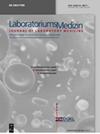Medical laboratory in autoimmunity 2017
IF 0.1
Q4 OTORHINOLARYNGOLOGY
Laboratoriumsmedizin-Journal of Laboratory Medicine
Pub Date : 2017-08-28
DOI:10.1515/labmed-2017-0077
引用次数: 0
Abstract
Abstract With big data algorithms and artificial intelligence (AI) at stake the optimal assembly of the most appropriate lab assays selected to diagnose, treat and follow up patients suffering from well-delineated disease may get lost. The physician ordering a lab test, instead of asking for a good composition of screening tests is tempted to order a large number of assays, including genome sequencing hoping to find the diagnostic evidence for his/her patient at once. Four major specialities of medical laboratory assays, i.e. clinical chemistry, hematology, immunology and microbiology are embraced by genome sequencing techniques and have attained the degree of robotics, facilitating assays to such a degree, that the prescriber is free of concern as to how costly/complicated an investigation might become. Diagnostics with autoimmune diseases is not an exemption and autoantibody screening using multiplex assays or therapeutic drug monitoring to adjust treatments of inflammatory/autoimmune diseases is bound to become more and more informative even more so as the pharmacodynamics of modern pharmaceutical agents are explored. As the most appropriate therapeutical agents to monitor in the lab, biological response modifiers, immunosuppressants and monoclonal antibodies are at the forefront and we need to explore their efficacy and side effect profiles not only using phase III clinical studies but also by using postmarketing surveillance. Behind the profiles provided by big data and artificial intelligence, the therapeutically-induced regained immune balance can thus be traced to the single best lab assay. The next decade promises a series of new assays, e.g. inflammasome profiles, lymphocyte markers by fluorescence activated cell sorters as well as single cell secretome analysis.自身免疫医学实验室2017
随着大数据算法和人工智能(AI)的发展,选择最合适的实验室检测方法来诊断、治疗和随访患有明确疾病的患者可能会失去最佳组合。医生要求进行实验室检查,而不是要求提供良好的筛选测试组合,他倾向于要求进行大量的分析,包括基因组测序,希望立即为他/她的病人找到诊断证据。医学实验室分析的四个主要专业,即临床化学、血液学、免疫学和微生物学,已被基因组测序技术所接受,并已达到机器人技术的程度,使分析变得如此便利,以至于开处方者不必担心调查可能变得多么昂贵/复杂。自身免疫性疾病的诊断也不例外,随着现代药物的药效学研究的深入,使用多重检测或治疗性药物监测来调整炎症/自身免疫性疾病的治疗方法的自身抗体筛查必将变得越来越有用。作为最适合在实验室监测的治疗药物,生物反应调节剂、免疫抑制剂和单克隆抗体处于最前沿,我们不仅需要通过III期临床研究,还需要通过上市后监测来探索它们的疗效和副作用概况。在大数据和人工智能提供的资料背后,治疗诱导的免疫平衡恢复可以追溯到单一的最佳实验室分析。未来十年将出现一系列新的检测方法,如炎性体谱、荧光激活细胞分选仪的淋巴细胞标记以及单细胞分泌组分析。
本文章由计算机程序翻译,如有差异,请以英文原文为准。
求助全文
约1分钟内获得全文
求助全文
来源期刊

Laboratoriumsmedizin-Journal of Laboratory Medicine
MEDICAL LABORATORY TECHNOLOGY-
CiteScore
0.80
自引率
0.00%
发文量
1
审稿时长
>12 weeks
期刊介绍:
Information not localized
 求助内容:
求助内容: 应助结果提醒方式:
应助结果提醒方式:


